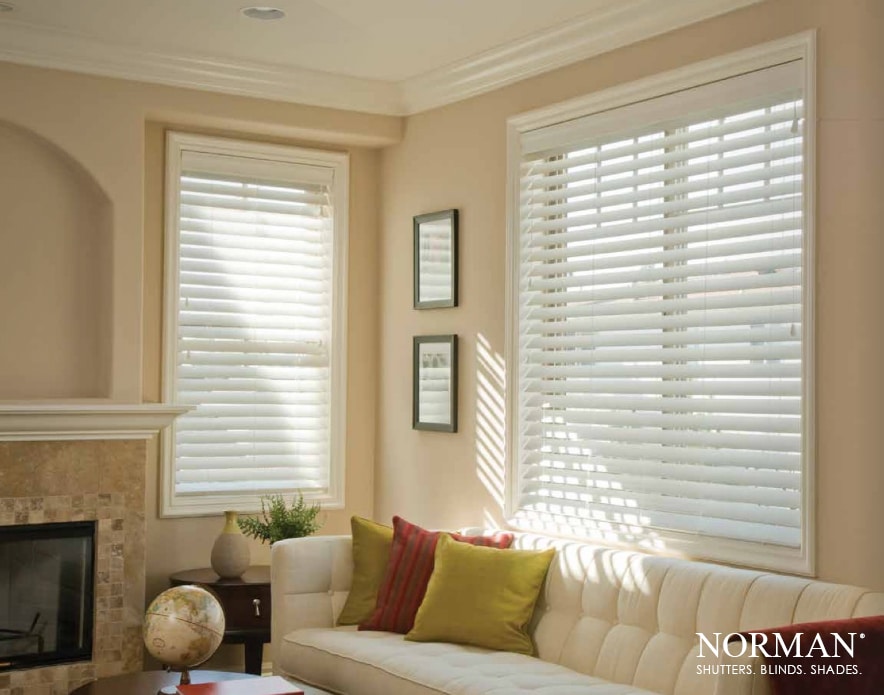With summer just around the corner, you might be thinking about freshening up your window treatments to reflect the warmth and color of the season. But did you know that the right combination of window treatments can actually help save you money while the summer sun is blazing?
We’ve put together some vernal variations you can explore to bring together beauty and energy efficiency in your home’s window treatments.
Combining Style with Savings
Like a lot of Chicagolanders, you probably know all too well the challenges of keeping your home comfortable in both freezing, snow-swept winters and broiling, sunny summers. But one area you might’ve overlooked is your window treatments. The EPA tells us that the major source of energy loss (winter and summer) is leaky windows and doors. So a good place to start saving money is sealing any leaks, adding some storm windows (adding one inside or outside can increase your windows’ energy efficiency by up to 33%, and perhaps considering some “low-e” coatings for your windows to reduce passive heat.
However, while these upgrades and maintenance tips are a fantastic place to start, they don’t really add anything terribly stylish to your home’s overall aesthetic. Some clever (and energy-efficient) window treatments and accessories added to the mix can help elevate your decor to new heights while pushing your energy bills ever lower.
Summertime is Blind Time
Because their slats do a much better job of blocking the sun’s rays than the flow of air, blinds offer much greater energy savings in the summer than the winter. Vertical or horizontal, inside or out, blinds allow you to control both light and ventilation in a rainbow of colors and materials that can be integrated into just about any decorating scheme.
And, according to the Department of Energy, choosing a highly reflective blind material and color (such as white aluminum) can reduce heat gain in your home by up to 45% when the shades are fully closed and lowered.
Beat the Heat with Cellular Shades
One of the most energy-efficient (and attractive) window treatments on the market today is cellular shades. A favorite with just about anyone who enjoys looking good while saving money, these honeycomb wonders trap air in their chambers (creating insulation all year long) and operate from top to bottom, allowing you to control the amount of light (and heat) you let in throughout the day. Like blinds, they’re available in a wide variety of materials and colors, and can be upgraded with a blackout option if you’re extremely keen on keeping the sun out of your bedroom, media room, or office.
The Drape Escape
While many modern looks eschew the traditional soft treatments in favor of clean, modernist lines, those with an eye for the classics as well as cutting their A/C bills might want to consider adding drapes to their window ensemble. Because they’re made of a truly staggering number of materials, finding hard data on how much savings draperies bring to the table is difficult. But with blinds, the department of energy found that light or medium colored drapes, with white plastic backing, can reduce heat gain by a third.
If you’re adding draperies to complete your look and want to maximize energy savings, be sure to add a cornice and seal the draperies at all four edges. Use thermal, closed-weave materials, and be sure to have the drapes cut to pool at least a little on the floor (crinkled fabric sheds heat through convection). Layering drapes (a sheer and a heavier contrasting curtain, for example) can create yet another layer of insulating air that helps reduce heat gain. Be sure to close all the drapes on windows you won’t be needing during the day to maximize their heat-fighting abilities.
A Word on Light
Chances are, using one, some, or all of the treatments we’ve listed will reduce heat in your home, and along with it, ambient sunlight. If you’re a sun worshipper who loves a lot of light (but not a long number on your energy bill), consider using your blinds or shades to angle the sunlight up to a neutral or pastel ceiling. A light-colored ceiling will allow the light to spread without spreading as much heat.
There’s no need to sacrifice fashion or function with your window treatments this summer. Reach out to your friendly neighborhood window treatment experts and arrange a consultation to find out the right blend of style and savings for you.



